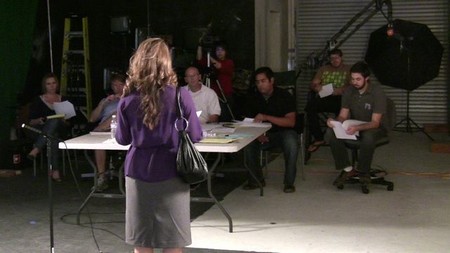In ninth grade I auditioned for a school play. And got the lead! I was psyched! (Except it turned out the lead character was named Binky, and I had to wear this really goofy dress with plaid knee socks. And get stuck being called Binky the rest of my high school life.)
Auditioning can mean trying out for a school play (hopefully for a better part than a Binky), community theater, a local commercial. Or, hey, maybe you take it a step further and try out for a national television show. Whatever it’s for, auditioning isn’t easy. It can be totally nerve-wracking. You might feel a lot of pressure, especially if you really want the role.
Harriet Greenspan has been a casting director for more than 20 years as well as a producer. The casting director is the person who watches the auditions and recommends who should get the part. She’s worked for ABC and is now doing casting for some pilots for Nickelodeon. She’s seen tons of teen actors walk in the door. And out. She’s got some advice for you on your auditions:
Try to get information about the role in advance. Get your hands on a script if possible. If you cannot memorize it, try your best to know it well. Sometimes you will be able to get the script a day before and sometimes the same day. You might not have a lot of time to look it over. Just do the best you can.
Get extra help if possible. Ask for help from an experienced actor or an acting coach to practice your lines. Always accept feedback to help you improve. If you don’t know anyone to help you and you have the time, call an acting school. See if you can hire a coach or an acting student with experience to help you.
Be prepared. If you’re not prepared for a professional audition, don’t go to the audition at all. Casting directors have good memories, and you don’t want a reputation of being unprepared. Don’t take on more than you can.
It’s audition time! Harriet has some tips for what you should do to make the most of the opportunity you’ve got:
- Don’t feel intimidated. Try to be as relaxed and comfortable as you can be. But also know that casting directors often don’t have much time; and if you see a crowded reception area, you can be assured they have a lot of auditions that day. Their patience is limited.
- Smile and shake hands with everyone. Say, “It’s nice to meet you.” Looking people in the eye always helps.
- Don’t ask too many questions. If it’s an audition with a casting director, you can ask her one or two questions.
- Don’t ask: Should I do it again? If they want you to do it again, they’ll tell you.
- Don’t worry if you make a mistake. Just ask to start again. If you screw up a line or two, don’t worry, everyone does it; just stay in character and go on. You might be asked to say the lines a different way. Don’t take this as meaning that you are doing poorly; it is the opposite. It often means they are interested in you and want to see how you take directions.
- Be prepared to read for someone else. If you’re auditioning for the media, you might get sent next to the producer. This is a good sign. You know you’ve done a good job when other people want to see you.
- Say thank you. When the audition is done, say thank you and leave.
- When you are done, don’t stress over how you did. Just leave it all behind you.
If you don’t get the part, don’t be too hard on yourself. But you have to know it doesn’t mean you aren’t good. It could be anything from hair to height or that they already had someone in mind but weren’t sure and wanted to see more people. As long as you went in prepared and did the best job you could, don’t try to second-guess yourself.
Keep trying. I have people who are new to the business read for me and they might need more work at first. As they get better, I end up casting them.
